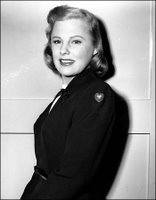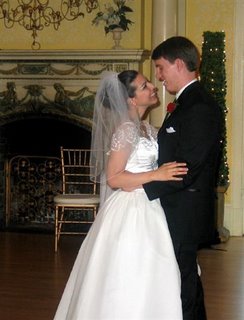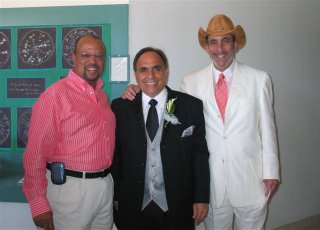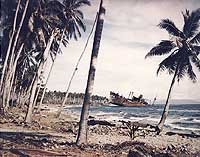 About a year ago I was writing in this space about the neverending debate between "Darwinists" and "creationists." In using the term "neverending" I'm speaking from a purely pragmatic viewpoint: the debate began "raging" in 1925 with the John Scopes "Monkey" trial, had some kerosene thrown on it 30 years later when a Broadway play based on the Scopes trial hit the boards and then the silver screen, and in recent years has flamed up yet again. 80-plus years of argument does nearly qualify as "neverending," I think.
About a year ago I was writing in this space about the neverending debate between "Darwinists" and "creationists." In using the term "neverending" I'm speaking from a purely pragmatic viewpoint: the debate began "raging" in 1925 with the John Scopes "Monkey" trial, had some kerosene thrown on it 30 years later when a Broadway play based on the Scopes trial hit the boards and then the silver screen, and in recent years has flamed up yet again. 80-plus years of argument does nearly qualify as "neverending," I think.Last New Year's I brought this subject up chiefly to comment on the poisonous incivility that has informed the issue. The single biggest poisoner: biologist Richard Dawkins, a passionate darwinian who has swallowed that particular version of evolutionary theory whole and finds in it not only justification for atheism, but for a noisy, high-profile crusade against religious belief of any kind.
Nothing new about this of course. Atheists have been screaming about the irrationality of religious belief for centuries. But Dawkins is unusually vehement, even for a typical village God-denier. With sneers, jeers and buckets of snot, he dismisses anyone who refuses to accept the darwinian whole cloth he has swallowed as either ignorant or an idiot or both.
My chief objection, a year ago, was not so much to Dawkins' opinions. As I'll point out in a moment, there is absolutely nothing new about them. Science and secular philosophy have been sneering at religion since Darwin and long before that. No, my main objection was to Dawkins' childishness, his arrogant sense of certainty, that his opinion is the only correct one and that anyone who disagrees with him should be locked up as dangerous. You see, I met a great many Richard Dawkinses when I was in elementary school. They were the often-bespectacled nerdy boys who never got picked for kickball. Resentful of their nerd-status on the playground, they tended to spend recess walking around the perimeter of the schoolyard, talking about Einstein. To compensate for the fact that they never got picked for kickball or asked to run for class president, they put on a cloak of intellectual superiority and went around calling anyone who wasn't interested in the theory of relativity an idiot.
I knew these kids well. I was one of them. But I grew up. Evidently Richard Dawkins didn't.
But now I have something new to object to. For some reason Dawkins and fellow atheist tub-thumpers such as Sam Harris are getting boatloads, truckloads, stadium-loads of publicity lately, and I'm still trying to figure out why.
As I just pointed out, there is absolutely nothing new about atheism. Shelley published a spirited defense of it in 1809. Baron d'Holbach was pitching atheism as part of the French Enlightenment in the mid-18th century.
And you can take it back much, much further. Bertrand Russell, the most famous atheist of the 20th century, claimed that his own view of the universe was essentially that of Lucretius, the 1st-century B.C. philosopher of science who reduced the entire universe to atoms, and is therefore considered by many to be the father of reductionist materialism, the notion that if we can simply reduce everything to the smallest possible components of what it's made of, we will have figured out the secrets of everything. Russell discussed his debt to Lucretius in his most famous book, The History of Western Philosophy. Why Russell, a mathematician, was so proud to adopt the worldview of a man who lived 1,500 years before such basic scientific tools as the telescope and microscope is a question no one ever bothered to ask. I would ask him now, but he died in 1971.
Even as Dawkins and his ilk aspire to reduce biology to chemistry and hence, to pure mechanics, some are arguing that reductionist materialism has taken us about as far as it can. But that still leaves me wondering why Dawkins and company are getting so much press. Dawkins' name pops up on Arts and Letters Daily.com at least once a week. His name was recently on the cover of Time magazine and it also seems to be on an awful lot of people's lips. You'd think the media had never seen an atheist before.
A recent issue of Wired magazine trumpeted from its cover: "The New Atheism: Inside the Crusade Against Religion."
Why have reductionist materialism and its nephew, atheism, become the latest version of radical chic? And why is Richard Dawkins suddenly as big a celebrity as Paris Hilton?
Political explanations have been offered. I privately wondered, not long ago, if atheism's current vogue on the covers of major magazines might not have something to do with President Bush. Cultural trends are always reactions to something, and in the United States anyway, there is no cultural catalyst quite like an unpopular president.
While I was thinking these thoughts, Jonah Goldberg verbalised them for me on National Review Online. Since Bush has been demonized for his supposedly-messianic sense of the rightness of his cause, and moreover since he is a self-professed evangelical Christian, Goldberg suggested that the nearly-pathological levels of hatred for Bush on the left and in academia may indeed lie at the core of the current craze for making Christian fundamentalism, and religion in general, out as the latest great threat to American democracy. Secularists, most of them on the left, are screaming about the "danger" of religious believers and their "certainty" about the truth of their beliefs. (The same people, meanwhile, have little or nothing to say about Islamic fundamentalism, looking the other way while it stages suicide bombings and flies airplanes into skyscrapers.)
Goldberg's logical retort to militant secularists : You decry believers for their "certainty." What about YOUR "certainty?" Dawkins is so "certain" that there isn't a God that he wants to round up and imprison those who are certain that there is. Why is he allowed his "certainty," while those who don't share it are labeled "dangerous?"
I have another question for those who believe that if only we abolish religion from the earth, we'll all be living in a utopia of peace and brotherhood, "relating to each other instead of to some fictitious deity." Religious belief, we are told, has given the world only intolerance, bigotry and genocide. Even if that were true, which it isn't, (Christianity, especially Catholic Christianity, has a rich humanistic tradition) if you want to check up on religious bigotry, intolerance and advocacy of genocide, I would forget about Pope Benedict XVI, or even Jerry Falwell, and go talk to Mahmoud Ahmadinejad. That's his billiard-cue.
Anyway, here's my question: have any of you "atheist-chic" types taken a look at recent history? Because I have a news flash for you: despite John Lennon's treacly little song Imagine, with its simple-minded vision of a religion-free paradise, atheism does not have much of a track record for promoting peace and brotherhood.
In fact atheism's track record reads more like a rap sheet: Stalin made atheism the state religion of his utopia, and quite a utopia it was: Siberian labor camps running at full capacity, secret police pounding on doors in the middle of the night, innocent people shot through the head in cellars, family members disappearing never to be heard from again, a general atmosphere of terror and paranoia everywhere. But those nasty old churches had been closed and turned into museums, so all of this had to be to the good, right?
More recently we have North Korea, the atheistic paradise in which those caught practicing religion have their heads crushed by steamrollers.
John Lennon sang wistfully that he was a "dreamer," then added "but I'm not the only one." I saw these words on a bumper sticker recently and they made my blood run cold. If atheism's record for compassion is anything to go by, Lennon's dreamy notion that "the world will be as one" after religious belief has been banned is a bone-chilling one. (Or perhaps I should say "bone-crushing.")
But getting back to my original subject, the debate between "darwinists" and "creationists," I really don't think this debate will ever be settled, never mind Richard Dawkins' belief that he's on the verge of great, God-destroying scientific breakthroughs.
Why? Because the two sides are not even speaking the same language. Despite the gaps in Darwin's theory, (and it DOES have gaps in it, never mind what Dawkins tells you: Darwin lacked the equipment and the data to speculate about, for example, the living cell, and his elegant theory, while it does account for much, does not jive with fossil evidence) its proponents claim to be speaking the language of science. "No heaven, No hell, just science," said the cover of Wired.
Well, that's fine. But we have tended, over the past century, to make science the new religion. Dawkins gets points from the secular left for his supposedly-honest desire to subject religion to the same criteria of scrutiny as science. This is disingenuous at best, sheer party propaganda at worst. Why should faith in science replace faith in God? Really, why should it? I believe in the benefits of scientific research, but I see no reason to dethrone God and put science in his place. Science loves to brag about how smart it is, but science has frequently been wrong. Why should we condemn religion for its mistakes and give science a pass for its own? Both are human artifacts.
The enthronement of science in the 20th-21st century mind, believe it or not, has a precedent. The 18th century similarly enthroned "reason," with science under reason's umbrella. The Enlightenment, as led by the likes of Voltaire, Diderot and yes, Baron d'Holbach, convinced thinkers in the West that man was a fundamentally a rational animal who, once he was shorn of his demons and superstitions, would follow reason ever forward into the daylight of peace, tolerance and forebearance.
Then along came the French Revolution, running amok with guillotines, swimming in blood. So much for reason. And if that wasn't enough to convince everyone that reason was a pretty wobbly peg to hang your hat on, there followed the Napoleonic wars, World War I, World War II and everything else they brought in their train.
We have all benefitted tremendously from science. And it is good to keep our minds free of cobwebs. But the enthronement of science as the new be-all and end-all makes no more sense to me than the enthronement of reason proved to be, and by the way I, for one, would not want to live in a world governed by a council of Richard Dawkinses.
Religion, unlike science, requires the leap of faith. This initially made me suspicious of Intelligent Design theory because, like all who were raised in a world steeped in science, I could not take seriously a "scientific" proposition that began with a religious idea, e.g. that there is a God, and that we are going to undertake a study of nature aimed at proving that there is a God. Science doesn't start with such suppositions. It analyses the evidence and then draws conclusions, it doesn't begin with conclusions.
But it's this very leap of faith that will keep the two sides from ever really finding common ground. Michael J. Behe's book "Darwin's Black Box" (1996) calls into question some of the presuppositions of the darwinist flavor of natural selection, and puts forth the idea that the irreducible complexity of nature (significantly, in the living cell) cannot be accounted for by the baby-steps approach to natural selection put forth in Darwin, and therefore must be accounted for by some other means. Behe sees intelligent design as that means. Dawkins hoots and jeers, calling the idea "Behe's empty box." But I see every bit as much "certainty" in Dawkins as in Behe, and not a shred more reason to believe one rather than the other.
With this "debate" having received so much shrill media attention recently, I suppose it's no surprise, the rapidity with which it reached the level of the funny papers. Just a couple of weeks ago, a pre-Christmas entry of Berkeley Breathed's Opus comic, featuring the funny little penguin we all remember from Breathed's 1980's Bloom County strip, had Opus the Penguin and Steve Dallas the sleazy lawyer playing the roles, respectively, of a Dawkins and a Behe. Throughout the strip they conduct their debate at the level of "Was created!" "Just happened!" And neither has any real evidence to back up his claim. Then, at the end, they part in a spirit of yuletide reconciliation...blowing raspberries at each other.
I think that pretty well says it. Bring on the next big debate. And keep in mind what I quoted atheist Arthur C. Clarke as saying in a blog posting a few months ago: "The truth will be far stranger."
Happy New Year.










